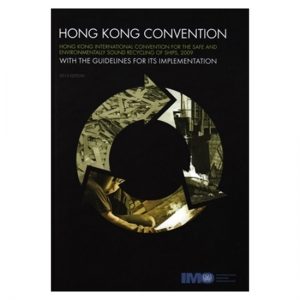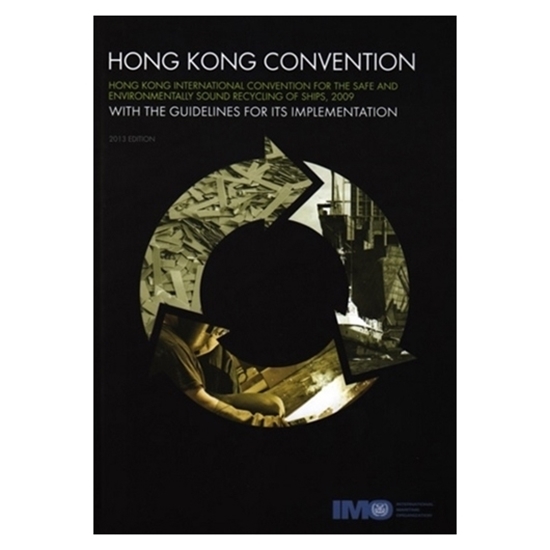Ship recycling refers to the process of dismantling and disposing of marine vessels that have reached the end of their useful life. Ship recycling is a complex and highly regulated process, as it involves handling hazardous materials and potentially toxic substances, such as asbestos, lead, and oil.
Ship recycling involves strict adherence to international safety and environmental standards like the Hong Kong Convention and Basel Convention, ensuring worker protection, eco-friendly practices, and proper hazardous waste disposal. Certified ship recycling facilities must meet rigorous safety and environmental criteria while employing trained personnel. Before dismantling, vessels undergo decontamination—removing asbestos, fuel oil, and residual fluids—to minimize pollution risks. The ship is then systematically broken down, with valuable materials (steel, aluminum, copper) recovered for reuse in other industries, supporting the circular economy. Finally, waste management protocols ensure safe disposal of hazardous and non-recyclable materials in line with global regulations, making ship recycling a critical component of sustainable maritime practices.
Ship recycling is the systematic dismantling and disposal of decommissioned ships, ensuring safe handling of hazardous materials like asbestos, lead, and oil. As a highly regulated industry, it plays a crucial role in marine environmental protection, circular economy practices, and sustainable maritime operations.
Why is Ship Recycling Important?
-
Environmental Protection: Prevents toxic waste leakage into oceans and coastal ecosystems.
-
Resource Recovery: Recycles steel, aluminum, and copper, reducing mining demand.
-
Regulatory Compliance: Follows MARPOL Convention, Hong Kong Convention, and Basel Convention standards.
-
Worker Safety: Ensures safe dismantling practices under IMO guidelines.
Key Challenges in Ship Recycling
-
Hazardous Waste Management (asbestos, PCBs, oil residues)
-
Illegal Shipbreaking (beaching in unregulated yards)
-
Global Enforcement of Hong Kong Convention (ratification progress)
 The Hong Kong International Convention for the Safe and Environmentally Sound Recycling of Ships, also known as the Hong Kong Convention, is an international treaty developed by the International Maritime Organization (IMO) to regulate the safe and environmentally sound recycling of ships.
The Hong Kong International Convention for the Safe and Environmentally Sound Recycling of Ships, also known as the Hong Kong Convention, is an international treaty developed by the International Maritime Organization (IMO) to regulate the safe and environmentally sound recycling of ships.
The Convention was adopted by the IMO in May 2009 and is aimed at ensuring that ships, when being recycled after the end of their operational lives, do not pose any unnecessary risks to human health, safety or the environment. It seeks to address concerns regarding the working conditions and environmental impact of shipbreaking practices, which have been documented to be substandard in many parts of the world.
The Hong Kong Convention includes regulations covering the entire life cycle of a ship, from its design and construction to its operation and eventual dismantling. The regulations require that ship owners ensure that ships to be recycled are only sent to ship recycling facilities that are authorized and certified to carry out the work. Such facilities must be located in countries that have ratified the Convention and meet stringent safety, health and environmental standards.
The Convention also mandates that ships to be recycled must be thoroughly cleaned of all hazardous materials, such as asbestos, polychlorinated biphenyls (PCBs), and other toxic chemicals, before being sent for dismantling. The Convention requires that a detailed inventory of hazardous materials be drawn up and made available to the recycling facility before the ship is dismantled.
In addition to regulating the safe and environmentally sound recycling of ships, the Hong Kong Convention also includes provisions related to the monitoring and enforcement of the regulations. It provides for the development of a mechanism for monitoring compliance and for the imposition of sanctions against those who violate the Convention’s provisions.
However, the Hong Kong Convention has not yet entered into force, as it requires ratification by a minimum of 15 states, representing at least 40 percent of the world’s merchant shipping by gross tonnage. As of April 2023, 16 states, representing 28.84 percent of the world’s merchant shipping by gross tonnage, have ratified the Convention.
Despite its slow progress towards entry into force, the Hong Kong Convention is widely regarded as a significant step forward in regulating the ship recycling industry and improving the safety and environmental standards of shipbreaking practices. Its successful implementation is expected to benefit not only ship owners, but also the workers and communities affected by ship recycling activities and the environment.
–
Sustainable Solutions for Ship Recycling
-
Green Ship Recycling Facilities (EU-approved yards)
-
Digital Inventory of Hazardous Materials (IHM) for safer dismantling
-
Circular Economy Integration – Reusing ship materials in new industries
Looking Ahead: The Future of Ship Recycling
With the Hong Kong Convention now in force (2025), the industry is shifting toward eco-friendly ship disposal, stricter port waste management, and zero-pollution recycling technologies.
FAQ :Frequently Asked Questions About Ship Recycling and the Hong Kong Convention
1. What is ship recycling?
Ship recycling refers to the dismantling of end-of-life vessels to recover valuable materials—such as steel, aluminum, and copper—while safely managing and disposing of hazardous substances like asbestos, oil, and heavy metals.
2. Why is ship recycling important?
It plays a critical role in reducing the environmental footprint of retired ships. By recovering reusable materials and properly handling toxic waste, ship recycling supports a circular economy and safeguards the health of workers and marine ecosystems.
3. What are the key regulations governing ship recycling?
The Hong Kong Convention (IMO) and the Basel Convention (UNEP) are the primary international frameworks. They establish global standards for environmentally sound recycling, worker safety, and the management of hazardous materials during ship dismantling.
4. What is the Hong Kong Convention?
The Hong Kong International Convention for the Safe and Environmentally Sound Recycling of Ships, adopted by the IMO, ensures that ship recycling activities are conducted without posing unnecessary risks to human health and the environment throughout a ship’s entire lifecycle.
5. Has the Hong Kong Convention entered into force?
The Convention will enter into force on June 26, 2025, after meeting the required threshold of 15 states representing at least 40% of the world’s merchant shipping tonnage.
6. What are the requirements for ship recycling facilities?
Ship recycling yards must be authorized and certified, maintain compliance with safety protocols, manage hazardous materials in accordance with regulations, and ensure proper documentation such as Ship Recycling Plans and Waste Management Systems.
7. How are ships prepared for recycling?
Before dismantling, vessels undergo decontamination. This includes the removal of hazardous substances like asbestos, PCBs, fuels, and oils, and the preparation of an Inventory of Hazardous Materials (IHM), which outlines all onboard risks.
8. What happens to materials recovered from recycled ships?
Recovered metals—including steel, copper, and aluminum—are reintroduced into manufacturing industries, reducing reliance on virgin raw materials and lowering the environmental impact of metal production.
9. What are the challenges in ship recycling?
Key challenges include inadequate enforcement of international standards, the continuation of substandard “beaching” methods, limited regulatory oversight in some countries, and a lack of investment in green recycling infrastructure.
10. How can the ship recycling industry improve?
Enhancements can be achieved through:
- Global enforcement of the Hong Kong Convention
- Greater transparency and accountability from shipowners
- Increased investment in modern, eco-friendly recycling facilities
- Collaborative international policy-making and education
–
External Sources & Further Reading
For comprehensive insights into ship recycling practices and international regulations, consult these authoritative resources:
-
IMO – Hong Kong Convention: Official convention texts and ratification updates
-
Basel Convention: Framework for managing hazardous waste across borders
-
Ship Recycling Transparency Initiative (SRTI): Industry-led platform promoting best practices
-
EU Ship Recycling Regulation (EU SRR): Legal framework for sustainable ship recycling in the EU
-
NGO Shipbreaking Platform: Advocacy for safer, more sustainable shipbreaking practices
By: Reza Karimpour, PhD.

